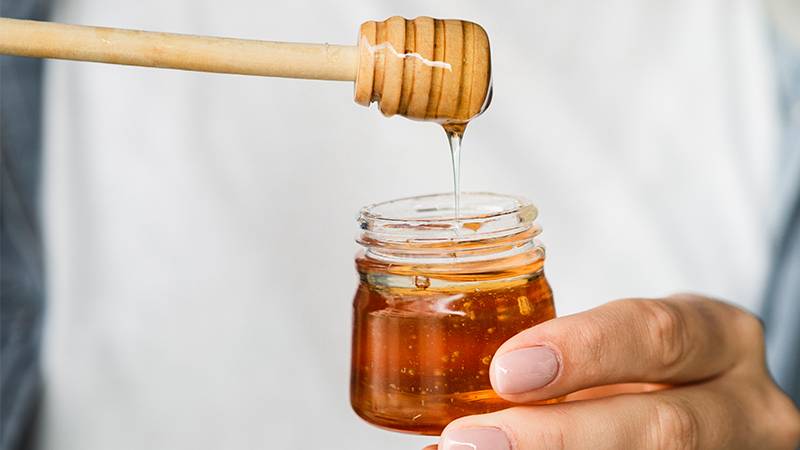When you think of veganism, you likely consider the usual suspects: dairy, meat, eggs. But what about honey?
It’s a question that stirs much debate in the vegan community. I’m here to explore this buzzing topic, diving deep into whether honey fits into a vegan and sustainable lifestyle. It’s more than just a sweetener; it’s about understanding the intersection of our food choices, animal welfare, and environmental impact.
So, let’s unravel the sticky question together: Is honey vegan? Join me as we navigate this complex yet fascinating aspect of sustainable eating and veganism.
Is Honey Vegan?
The short answer: traditionally, no.
In veganism, the use of animal-derived products is typically avoided, and honey is no exception.
Derived from bees, an essential part of our ecosystem, honey is often seen as a product of bee exploitation. Vegans opt out of honey to oppose practices they believe harm bee welfare and disrupt natural processes.
This stance underlines a commitment to cruelty-free living, reflecting the core values of veganism which prioritize animal rights and environmental sustainability.
What is Honey?
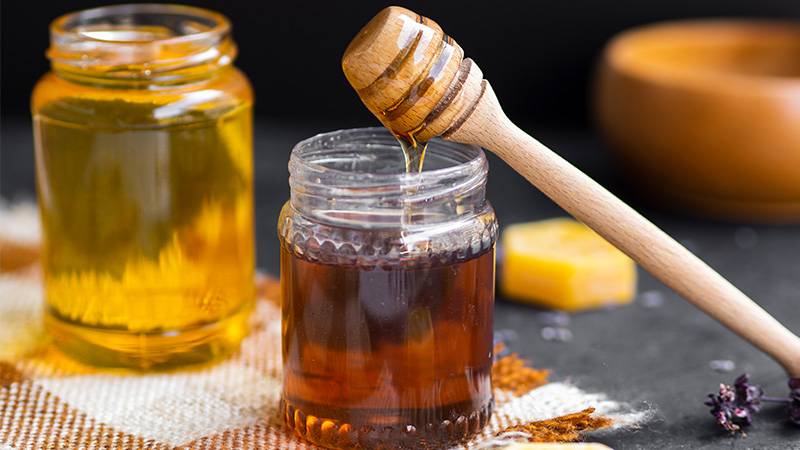
Honey is a natural sweetener produced by bees, a fascinating process that begins with bees collecting nectar from flowers. This nectar undergoes a transformation inside the bees, turning into the golden, viscous liquid we know as honey. Stored in the intricate wax structures of beehives, honey serves as vital food for bees, especially during colder months.
In its composition, honey primarily contains sugars like fructose and glucose, along with traces of minerals, vitamins, and antioxidants. These components give honey its sweet taste and some health benefits, making it a popular choice in various cuisines.
There are also several types of honey, each unique in flavor and color, depending on the flowers visited by the bees. From clover to manuka, the variety reflects the diverse flora that bees pollinate.
Commonly used as a sweetener in food and beverages, honey also finds its place in cultural practices and natural remedies. Its uses extend beyond culinary purposes, tapping into the realms of medicine and personal care, where it’s valued for its antimicrobial properties and soothing effects.
How is Honey Made?
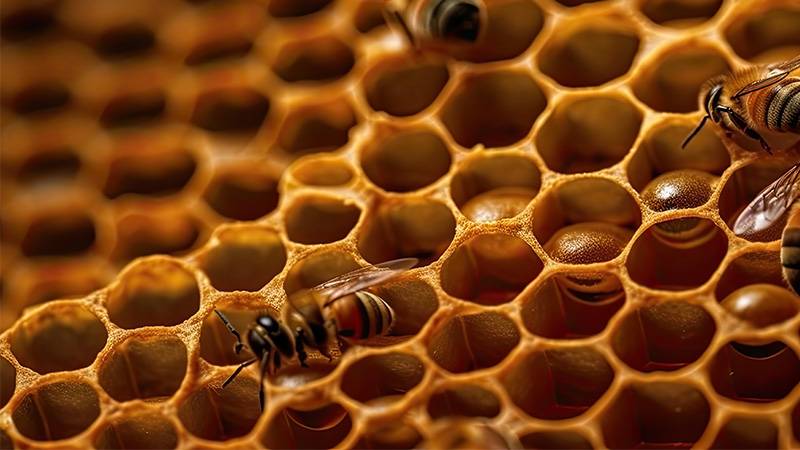
The journey of honey begins in the heart of blooming flowers. Bees embark on a meticulous process, visiting various flowers to collect nectar, a sweet liquid produced by plants. This nectar is carefully gathered by bees using their long, tubular tongues and stored in their “honey stomachs,” separate from their food stomach.
Once the bees return to their hive, the real magic starts. Here, the nectar is passed from bee to bee through a process called regurgitation. During this process, the nectar’s complex sugars break down into simpler forms, gradually transforming into honey. This is where the bees’ unique enzyme contribution comes into play, adding to the chemical changes of the nectar.
As the honey takes form, bees use their wings to fan the hive, promoting the evaporation of excess water from the honey. This act of fanning thickens the honey, preparing it for storage. Bees then deposit the thickened honey into the honeycomb cells, sealing them with beeswax. This sealing process safeguards the honey, keeping it pure and protected for times when food is scarce.
This entire process reflects an intricate balance of nature and the indispensable role of bees in our ecosystem. From flower to hive, each step in the honey-making process is a testament to the remarkable abilities of bees and their importance in sustaining natural cycles.

Read More:
Ethical Concerns in Honey Production
Bee Welfare
One of the primary ethical concerns in honey production is bee welfare.
Commercial beekeeping practices often prioritize yield over the health and natural behavior of bees. For instance, in some cases, bees are artificially fed sugar substitutes instead of being allowed to consume their own honey, which can negatively impact their health.
Moreover, practices like clipping the wings of queen bees to prevent swarming are seen as harmful and unethical by many animal rights advocates.
These interventions are viewed as exploitative, disrupting the natural life cycle and social structure of bee colonies.
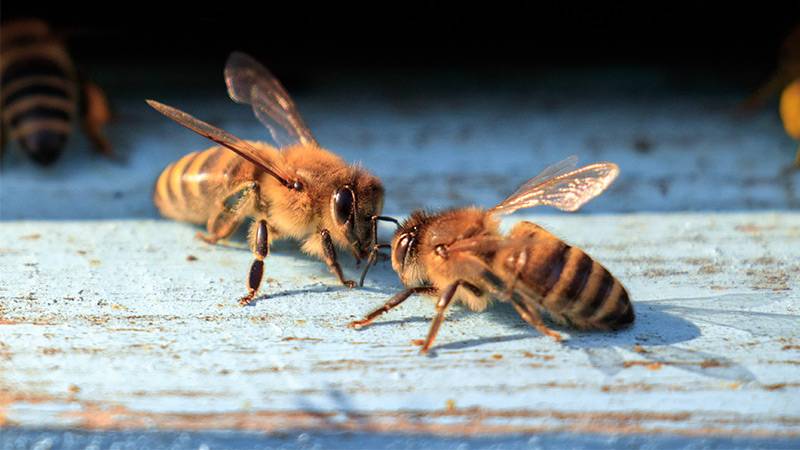
Environmental Impact
The environmental impact of honey production is another significant ethical issue.
Large-scale commercial beekeeping can lead to monoculture, where bees are predominantly exposed to single types of crops.
This practice not only limits the nutritional variety for bees but also affects local ecosystems and biodiversity.
Additionally, the transportation of bee colonies for pollination services contributes to carbon emissions and can spread diseases among bee populations, further endangering both domestic and wild bees.
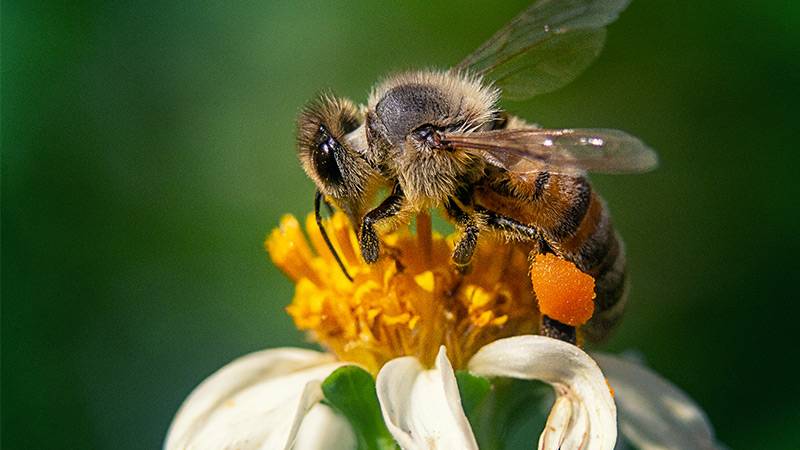
Commercial Practices and Sustainability
Commercial beekeeping practices are often at odds with sustainable and ethical beekeeping.
The focus on maximizing honey production can lead to overcrowded apiaries, which stress the bees and make them more susceptible to diseases and parasites.
Furthermore, the use of pesticides in beekeeping, intended to protect bees from pests, can have detrimental effects on bee health and the surrounding environment.
Sustainable beekeeping practices, on the other hand, advocate for more natural and less intrusive methods, emphasizing the importance of maintaining healthy bee populations and ecosystems.
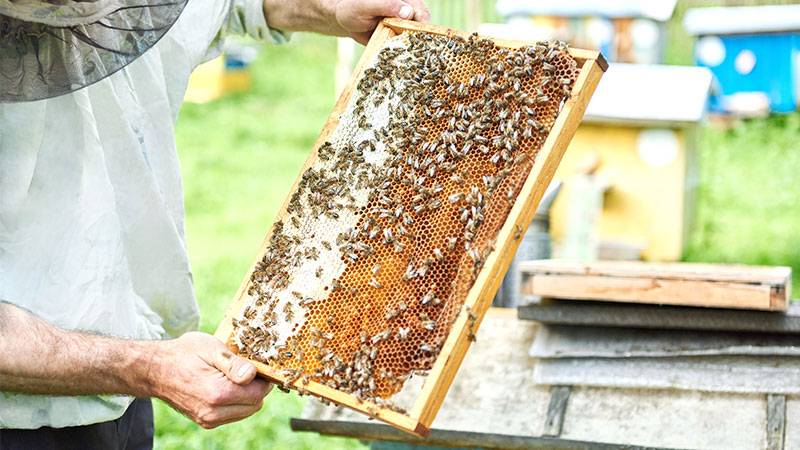
Vegan Alternatives to Honey
For those embracing a vegan lifestyle or looking for sustainable, cruelty-free sweetening options, there are several alternatives to honey. Each of these substitutes not only mimics the sweetness of honey but also offers unique flavors and benefits.
Agave Nectar
Derived from the agave plant, this sweetener is similar in consistency to honey and is sweeter, meaning you can use less of it. Agave nectar is a popular choice in vegan baking and works well in beverages.
Maple Syrup
Harvested from maple trees, maple syrup is a natural sweetener with a distinctive flavor. Rich in minerals like manganese and zinc, it’s a healthier option and is excellent in pancakes, baking, and as a topping.
Barley Malt Syrup
Made from sprouted barley, this syrup has a strong, malty flavor. It’s less sweet than honey but is great for baking, particularly in bread recipes.
Date Syrup
Produced from dates, this syrup has a rich, deep flavor and is packed with nutrients. It’s perfect for sweetening desserts and can also be used in savory dishes.
Molasses
This by-product of sugar production has a robust, bittersweet flavor. Rich in iron and calcium, molasses is ideal for baking and adds depth to sauces and marinades.
Brown Rice Syrup
Made from fermented cooked rice, this syrup has a buttery flavor and is a great honey substitute in recipes that require a milder sweetness.
Yacon Syrup
Extracted from the yacon plant’s roots, this syrup has a fruity taste and is lower in calories. It’s suitable for sweetening beverages and can be used in raw food recipes.
Coconut Nectar
Sourced from coconut palm blossoms, this sweetener has a caramel-like flavor. It’s nutrient-rich and works well in a variety of dishes, both sweet and savory.
Stevia
A natural sweetener from the stevia plant leaves, it’s much sweeter than honey and calorie-free. Ideal for those watching their sugar intake, stevia is versatile for sweetening drinks and desserts.
Is There Such a Thing as Vegan Honey?
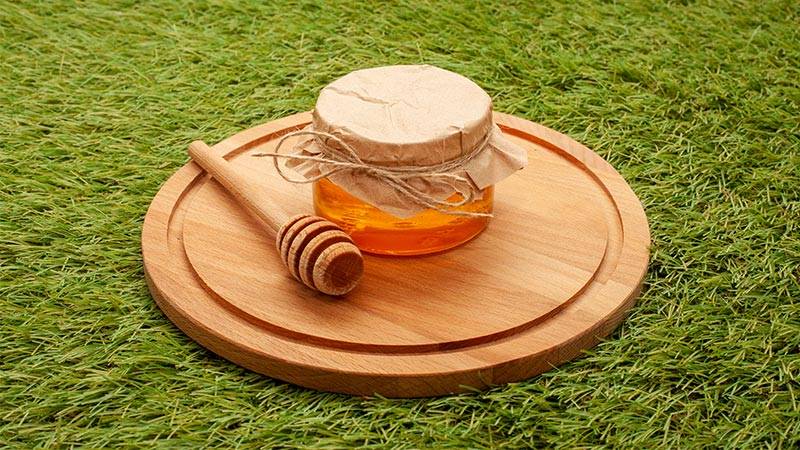
The concept of vegan honey is intriguing and has sparked innovation in the vegan and sustainable eating communities. While traditional honey is not considered vegan, there are products on the market that aim to replicate honey’s texture and sweetness using plant-based ingredients.
One notable product was “Bee Free Honee,” made from organic apples. It offered a similar sweetness and consistency to honey and can be used in the same way as traditional honey in recipes. This alternative was not only vegan but was also sustainable, as it didn’t rely on bee labor.
Another innovative product is “Honea,” a UK-based creation that mimics the texture and flavor of honey using dandelions and other botanical ingredients. It’s a cruelty-free and environmentally friendly option that caters to the ethical concerns of vegans.
There are also DIY recipes for vegan honey, often utilizing ingredients like dandelion flowers, sugar, and lemon juice to create a honey-like syrup. These homemade alternatives provide a hands-on approach for vegans to enjoy a honey substitute without compromising their ethical standards.
While these products and recipes do not contain actual honey, they represent the vegan community’s efforts to create alternatives that respect animal welfare and environmental sustainability. They show the feasibility of having honey-like products that align with vegan principles.
The existence of these vegan honey alternatives highlights the creativity and commitment within the vegan community to find solutions that respect animal rights and promote a sustainable lifestyle. As the demand for such products grows, we can expect to see more innovations in this space, further enriching the vegan diet and lifestyle.
Conclusion
In exploring whether honey is vegan, we’ve delved into the nuances of bee welfare, environmental sustainability, and ethical beekeeping practices.
We’ve seen that, while traditional honey doesn’t align with vegan principles, there are numerous plant-based alternatives that offer sweetness without compromising ethical values.
The emergence of products like Bee Free Honee and Honea underscores the vegan community’s commitment to cruelty-free and sustainable choices.
This journey through the world of honey and its alternatives highlights the importance of informed decision-making in sustainable eating and vegan lifestyles. May this guide serve as a valuable resource in your journey towards a more conscious and compassionate way of living.

